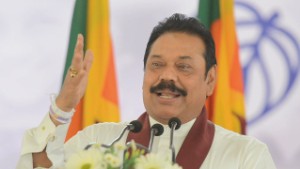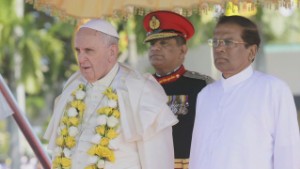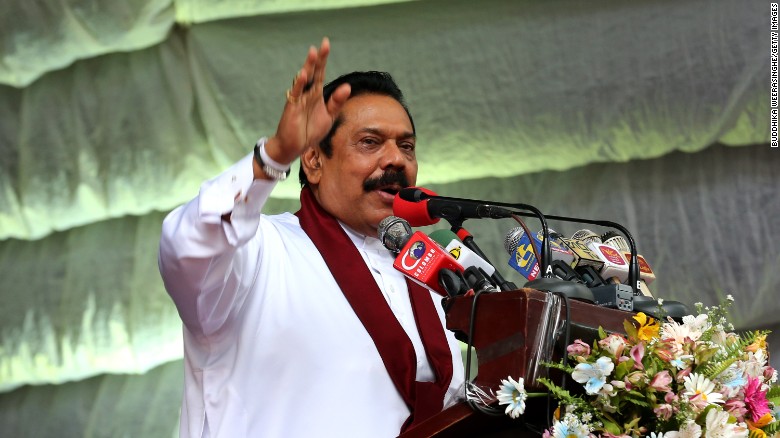End of the road for Mahinda Rajapaksa -- Sri Lanka's 'warrior king'?
In hindsight the odds were stacked against such a major comeback -- even for Sri Lanka's most powerful politician of the last decade.
Former president Mahinda Rajapaksa won his seat in Sri Lanka's parliamentary elections this week, but his Freedom Party won only 42% of the seats on offer -- not enough to give him a chance of becoming prime minister, Vladimir Putin-style.
It has been a stunning political reversal from a year ago.
If Rajapaksa's supporters retained hopes for a comeback, it was because the former president had long held an unprecedented hold on power. He was lauded as an almost mythical warrior king, the man who had won victory against Tamil separatists in a bloody and years-long civil war. At one stage, one of his brothers was a defense secretary; another was the Minister of Economic Development.
Many in Sri Lanka say the Rajapaksa family controlled politics, business, and the media. No longer.
The first -- and biggest -- blow came in January this year when Rajapaksa lost a close presidential election to his one-time health minister. In Sri Lanka, the president serves a five-year term and is the most powerful leader: a position made even stronger after constitutional amendments put in place by Rajapaksa.

Sri Lanka makes peaceful transition in presidential election
Rajapaksa then resolved to contest parliamentary elections in the hope of being named prime minister, despite new president Maithripala Sirisena openly saying he would not support his candidacy.
Embroiled in scandals
Meanwhile, a litany of criminal charges gathered steam against the Rajapaksa and his family.
The former leader has been embroiled in controversy over a $1.4 billion luxury port and resort complex near Colombo, to be built by a Chinese construction firm. But since Rajapaksa was unseated, the project has been put on hold amid allegations of possible corruption in the bidding process.
President Sirisena has directed his administration to investigate all deals signed by the previous government, looking for irregularities in contract negotiations.
Earlier this year, two of Rajapaksa's brothers -- both top former ministers responsible for defense and the country's economy -- were implicated in cases of corruption and bribery.
Rajapaksa has dismissed the allegations as part of a political vendetta.
Losing this week's parliamentary election is a second public blow for the former president.
"This is a reaffirmation of the citizens' desire for better governance," says Pakiasothy Saravanamuthu, the executive director of the Center for Policy Alternatives. "Rajapaksa has some support, of course. He is not completely knocked out. But it's a rejection a second time around."
According to Manik da Silva, a long-time political observer and editor of the Sunday Island newspaper, Rajapaksa may now have to devise a strategy to save his family. "His chief interest will be to strike a deal on the corruption investigations against himself and his family," says da Silva.
What next for Rajapaksa?

Pope pushes for reconciliation in Sri Lanka
Saravanamuthu points out that the next few days will be crucial as lawmakers consider whether to shift away from Rajapaksa and align themselves with a new coalition government.
"He risks being isolated. He may well conclude that after being rejected twice he should go away quietly," says Saravanamuthu.
Meanwhile, Sri Lanka's unlikely power couple -- President Maithripala Sirisena and likely Prime Minister Ranil Wickremesinghe -- will look to form a secular unity government and push through the political and economic reforms they had tried to implement earlier this year.
A key test of Sri Lanka's unity will come in September, when a report is submitted to the United Nations' Human Rights Council about whether war crimes were committed during Sri Lanka's civil war. By the U.N.'s own estimates, some 40,000 Tamil civilians were reportedly killed in the final bloody months of the conflict.
But whatever the outcome of the investigation, it will be yet another moment for the tiny island nation to consider the impact of the decade-long rule of Rajapaksa. The former president may no longer be in power but his legacy -- good and bad -- will continue to cast a lasting shadow on Sri Lanka.
News Courtesy: www.cnn.com











